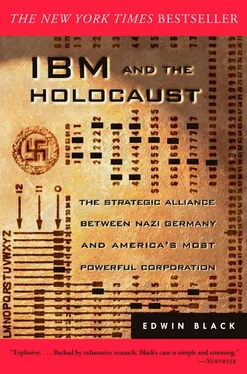Watson’s own son, Tom, who inherited his father’s throne at IBM, admitted, “The more I worked at IBM, the more I resented Dad for the cult-like atmosphere that surrounded him.” 78
Large pictures of Watson in the weekly company publication, Business Machines, regularly sported headlines proclaiming even his ordinary accomplishments, such as “Thomas J. Watson Opens New Orleans Office.” The ever-present equating of his name with the word THINK was more than an Orwellian exercise, it was a true-life indoctrination. The Watson mystique was never confined to the four walls of IBM. His aura was only magnified by his autocratic style, barking out orders, demanding everywhere the pinnacle of service and action at a moment’s notice, employing a secretary to ostentatiously follow him around scribbling notes and instructions on a steno pad. 79
Newspapers constantly reported his movements and exploits. It was written during this era that, “probably no businessman in the country gets his name and picture in the newspapers more often than he does. Watson makes hundreds of public appearances every year at banquets, university commencements, the opening of art exhibits and similar occasions.” Fortune referred to Watson as “the Leader,” with a capital “L.” So completely conscious was Watson of his mythic quality that he eyed even the porters on trains and waiters in restaurants as potential legend busters. He tossed them big tips, often as much as $10, which was largesse for the day. As he once explained, “there is a whole class of people in the world who are in a position to poor-mouth you unless you are sensitive to them. They are headwaiters, Pullman car conductors, porters and chauffeurs. They see you in an intimate fashion and can really knock off your reputation.” 80
By giving liberally to charities and universities, by towering as a patron of the arts, by arranging scores of organizational memberships, honorary degrees and awards, he further cultivated the man-myth for himself and IBM. 81
Slogans were endlessly drilled into the extended IBM Family. We Forgive Thoughtful Mistakes. There Is No Such Thing As Standing Still. Pack Up Your Troubles, Mr. Watson Is Here. 82
And the songs. They began the very first day a man entered the IBM culture. They never ended during one’s entire tenure. More than 100 songs were sung at various company functions. There were several for Watson, including the “IBM Anthem”:
There’s a thrill in store for all,
For we’re about to toast
The corporation that we represent.
We’re here to cheer each pioneer
And also proudly boast
Of that “man of men,” our sterling president.
The name of T.J. Watson means a courage none can stem:
And we feel honored to be here to toast the IBM. 83
Revival-style meetings enthralled the men of IBM. Swaying as they chanted harmonies of adulation for the Leader, their palms brought together in fervent applause in hero worship, fully accepting that their families and destinies were intertwined with the family and destiny of the corporation, legions of company men incessantly re-dedicated themselves to the “Ever Onward” glory of IBM. All of it swirled around the irresistible magnetism, the intoxicating command, the charismatic cultic control of one man, Thomas J. Watson, the Leader. 84
* * *
WATSON’S CONNECTIONSto Germany set the stage for a technologic and economic alliance with the Third Reich. It began soon after America’s entry into the Great War, when CTR’s pre-Dehomag property in Germany, albeit marginal, was seized by the German government for being owned by an enemy national. As it happened, Watson was delighted with how CTR’s assets were protected during receivership. His feelings were best expressed in a 1937 recollection he penned to Nazi Economics Minister Hjalmar Schacht. 85
“From the day I returned to Germany after the [Great] War,” Watson wrote Schacht, “to find my Company’s affairs in the best safekeeping by your Alien Property Custodian, well-administered and conscientiously managed, from the highly satisfactory experience gained in my association with German industry after the War while building up my Company in Germany, all through the time of Germany’s post-War suffering, recovery and setbacks, I have felt a deep personal concern over Germany’s fate and a growing attachment to the many Germans with whom I gained contact at home and abroad. This attitude has caused me to give public utterance to my impressions and convictions in favor of Germany at a time when public opinion in my country and elsewhere was predominantly unfavorable.” 86
He added, the world must extend “a sympathetic understanding to the German people and their aims under the leadership of Adolf Hitler.” 87
More than fundamental sympathy, Watson in 1933 possessed an extraordinary investment in Germany. It began in the early twenties during the height of Germany’s tornadic post-War inflation. It was a time when valueless German currency was transported from place to place in wheelbarrows and worth more as kindling than as legal tender. In 1922, Willy Heidinger’s Dehomag was a mere licensee of Hollerith equipment. But the monetary crisis in Germany made it impossible for Dehomag to pay royalties and other monies it owed to Watson’s CTR, which now controlled all of Hollerith’s patents. Dehomag’s debt was $104,000, or the astronomical sum of 450 billion marks. There was no way Dehomag could pay it. 88
Watson traveled to Germany and ruthlessly offered Heidinger two options: bankruptcy, or handing substantial ownership of Dehomag over to Watson. It began by Watson asking for only 51 percent of the stock. But as Dehomag’s financial position weakened, Watson abruptly upped his demand to 90 percent. Heidinger felt “cornered” with no choice: he ceded the German company to Watson, and Dehomag became a CTR subsidiary. When CTR was renamed IBM in 1924, Dehomag of course continued as an IBM subsidiary. Heidinger was allowed to retain approximately 10 percent of the stock. Dehomag could then still claim some token German ownership for appearance’s sake. 89
Ironically, Heidinger’s shares were a virtual ruse because he could only own them as long as he worked for Dehomag. Even then, he could not control the stock. Once Heidinger left the company, he would have to sell the shares back to IBM and only IBM. Moreover, Heidinger’s shares were used as collateral against large deferred company loans and a bonus system. For all intents and purposes, IBM now controlled the German company. 90
For a decade after IBM acquired Dehomag, Watson tightly managed the German subsidiary’s operation, setting its sales quotas, and at the same time benefiting from technical improvements to Hollerith systems devised by German engineers. Eventually, IBM began extending its influence overseas, creating subsidiaries or agencies in dozens of countries, each with its own name. With Watson’s persona bigger than IBM’s name, several of the companies were namesakes. Watson Belge was the Belgian subsidiary. Watson Italiana was the Italian subsidiary. In Sweden, it was Svenska Watson. In many places, the business names Watson and IBM were synonymous and inseparable. 91
But the German subsidiary’s revenues outshone them all. Many European countries were slow to adopt Hollerith technology. Germany, however, was more willing to accept the punch card systems. Indeed, of some seventy subsidiaries and foreign branches worldwide, more than half of IBM’s overseas income came from Dehomag alone. By 1933, Dehomag had turned in a spectacular financial performance, 237 percent of its quota, and Willy Heidinger was due to be one of the stars at the forthcoming Hundred Percent Club convention in New York. 92
Читать дальше












